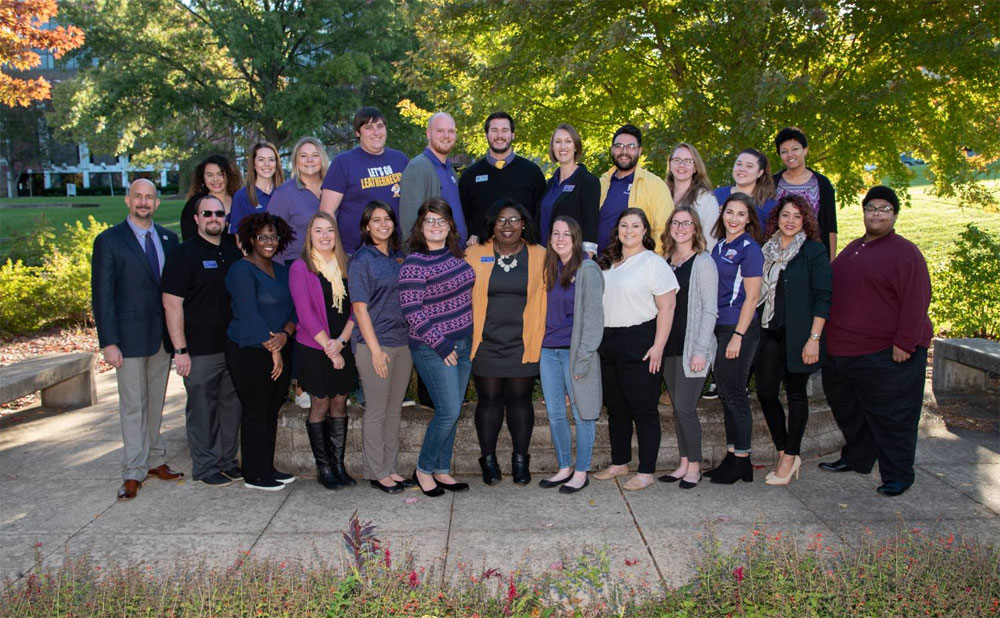Experiential Learning
The CSP program is built on the belief that both individuals and organizations develop through an experiential process that is collaborative, socially influenced, and shaped by historical contexts.
- In small, cohort-based classes, you will engage in discussions, explore questions, conduct research, and critically analyze the challenges and underlying issues facing student affairs and higher education.
- Faculty, student affairs professionals across campus, and our extensive alumni and professional networks will support and guide you throughout this journey.
- Your cohort, representing diverse locations, backgrounds, and student affairs experiences, will enrich your learning and growth throughout the program.
The CSP program emphasizes the ACPA/NASPA Professional Competency Areas for Student Affairs Educators, integrating these guidelines into both classroom learning and practical experiences. It also aligns with the Council for the Advancement of Standards (CAS) for Master's Level Student Affairs Professional Preparation Programs. Our mission is to provide a high-quality education focused on student affairs and higher education, while offering a solid foundation for those looking to pursue doctoral studies in the field.
Classroom Projects
Institutional Site Visit
CSP 553: Organization and Administration of Student Affairs offers a broad perspective on colleges and universities, covering governing boards, organizational structures, institutional leadership, and how the student affairs profession fits within these frameworks. Understanding these dynamics equips you to advocate for students and secure resources in your future career. To expand your understanding of various structural models and their impact on student affairs, you and your classmates will select a college or university to visit, where you will interview professionals, including the Chief Student Affairs Officer. Past groups have visited institutions such as the University of Wisconsin-Madison, the University of Missouri, and the University of Iowa.

What Students Say About Site Visits
Our site visit was a great experience all around, and we really enjoyed the practitioners and students we met and conversed with. During our visit to the University of Kansas, we learned a lot about the operations of their campus, ranging from their advising center procedures to their unique student Code of Conduct. We met with three different functional areas and the Vice President of Student Affairs. It gave me a broader perspective of how varying student affairs can be on a certain campus and I appreciated going through this experience with my group.
- Laura Casey ‘20
My site visit group chose to attend the University of Wisconsin at Madison! Only having significant administrative experience working at Western, a mid-sized school, it was so interesting to see how a Big 10 school ran things. Our group also met up with all of the CSP alumni currently working at UW Madison and we had an amazing lunch connecting over CSP, Western, and our experiences in Macomb. Overall it was a great experience!
- Erin Childers ‘21
Video Helping Session
A key highlight of the first semester is CSP 555: Advising & Helping Skills, where you develop a foundational understanding of basic counseling skills in the context of working with college students. Essential skills like active listening, asking open-ended questions, and demonstrating attending behavior are emphasized for student affairs educators. As part of the course, you engage in a video helping session with a peer, where you record your session and receive feedback on how well you apply course concepts and draw from your own experience.
With this assignment, you get the opportunity to help a classmate with a challenge they're facing by practicing and enhancing your counseling skills.
- Dr. Julie Brines ‘08, Assistant Professor
CSP ♥ Case Studies
In many of our courses, students work with case studies that challenge them to apply theory to campus-based situations, crafting practical solutions and deepening their understanding of the complexities involved in student affairs practice. For instance, they may use ethical decision-making frameworks and crisis response models to navigate scenarios related to student conduct or crisis management.
CSP ♥ Class Projects
Our students have the opportunity to improve the WIU campus community through projects like:
- Playing With the Pros - This program aims to cultivate a friendlier academic environment by fostering meaningful interactions between students and professors through a game night. (Planned for fall 2024)
- Decoding the Code of Student Conduct - This program is designed to help students gain a deeper understanding of Western's Code of Student Conduct, which defines the expectations for student behavior. (Planned for spring 2025)

Connect with us: